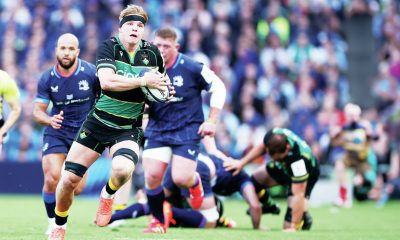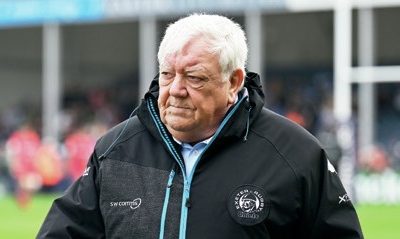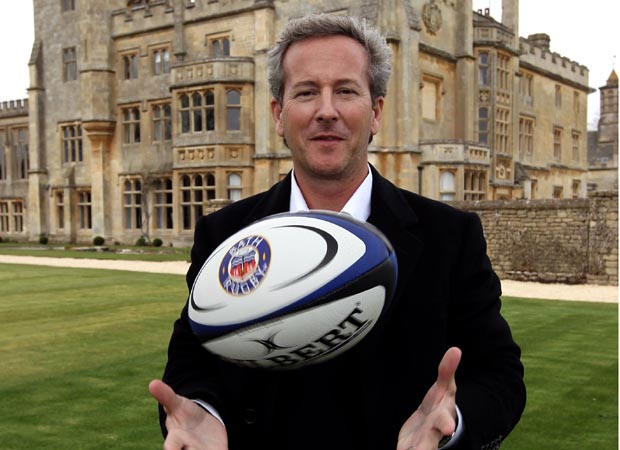 Nick Easter’s nickname suggests he is a man who has plenty of credit in the bank. The soubriquet that the Harlequins talisman is known by to most of his team-mates at The Stoop is “Minty”. It sounds like a variation on ‘minted’, but the moniker’s originator was Quins and England wing, Ugo Monye, because he believed that Easter shared a similar line in patter to a former East Enders character.
Nick Easter’s nickname suggests he is a man who has plenty of credit in the bank. The soubriquet that the Harlequins talisman is known by to most of his team-mates at The Stoop is “Minty”. It sounds like a variation on ‘minted’, but the moniker’s originator was Quins and England wing, Ugo Monye, because he believed that Easter shared a similar line in patter to a former East Enders character.
At 35, with a World Cup final (2007) and 47 England caps at No.8 in the locker, as well as a first Premiership title for Harlequins, Easter can contemplate retirement over the next few seasons confident in the knowledge that he has scaled summits that most players never get close to.
However, ask Easter if he is happy with his lot, and he doesn’t sit on the fence. He wants more. Undaunted by the fact that he has been shifted this season from his beloved berth at No.8 to the second row, he has set his sights on moving into Brad Thorn territory.
The teak-tough Thorn was an integral part of New Zealand’s 2011 World Cup triumph, playing in the final against France at the grand old age of 36, and a year later he helped Leinster beat Ulster to claim their third Heineken Cup title.
Although Easter will celebrate his 37th birthday a few weeks before the start of the 2015 World Cup, he is refusing to accept age as a barrier to the ambitions he harbours in the twilight of his career. Namely, a chance to right the wrongs of a disastrous 2011 World Cup campaign with England, and more
silverware for Quins, the club he has served with distinction for the past 11 seasons.
Easter side-steps the issue of whether he was a scapegoat for England’s 2011 failings – a role for which he was cast after his “there’s £35,000 down the toilet” remark in the changing room at Eden Park after the quarter-final loss to France. However, his frustration with not playing for England since then is clear.
“I was disappointed with how it ended. After the leaks the senior players were no more – we simply were not used. I spoke to Stuart Lancaster and he told me that I would not be involved in the Six Nations. I was angry, because they never had a grand plan before that…and then they started blooding youngsters. I feel that I could have added my experience, and that I still can.”
Easter adds, “I wanted to prove Stuart Lancaster wrong – and there’s something in me that will always do that. I would still give anything to pull on that white shirt. I feel that there is unfinished business after we were knocked out in the quarter-final with a pretty insipid performance.”
He goes on: “The most frustrating thing for me about the 2011 World Cup was not so much the off-field incidents as the way we played. Since then I’ve always made myself available, but I’m enjoying my rugby at Quins – and that’s what you want to be doing at this stage of your career.”
That enjoyment is clear in the way Easter has buckled down to second row duties, doing an outstanding job in the Harlequins boiler-room, and also captaining the side when Chris Robshaw is on international call.
So good has Easter been, showing not only great power and nous as a carrier, but also great dexterity as a key line-out target, that if you forgot entirely about age and past-indiscretions and relied purely on Premiership evidence, he is level-pegging with Courtney Lawes and Joe Launchbury as the most conspicuous, accomplished lock in the country.
In some ways, such as sheer footballing skill, he even outstrips the England incumbents, as showcased by a line-out catch against Newcastle last weekend and, as soon as his feet touched the ground, a 20 metre reverse pass straight into the hands of Nick Evans.
Easter says that the transition from No.8 to lock has not been too painful because Harlequins are a side who want their tight-five to be as comfortable on the ball as their backrow.
“The style we play at Quins has helped, because playing lock is not as far removed from No.8 as it would be in another side. I still manage to get my hands on the ball, even though you have to hit a few more rucks and get stuck into the tight stuff more.
“My training as a No.8 means that, along with carrying, I understand the game and can read it. As a lock I need to play to a pattern that exploits that – and, if that happens, you can add another dimension.
“No.8 is still the most influential position on the pitch as the natural link between backs and forwards, and some games I haven’t influenced as much as I would have liked. However, the understanding between the ball carriers, with Tom Guest at first receiver sometimes and me at others, helps it to work.”
Easter has never lacked self-confidence, and he hopes his switch to second row opens another avenue to the highest level.
“I think I’m good enough. I’ve always said that as long as I feel I’m getting better as a rugby player, then I’ll keep on playing – and I’m as happy playing at lock as anywhere else. That means you still have the desire to play at the highest level, and I feel as if I’m playing my best rugby in three seasons.”
His assessment of Thorn’s attributes are also instructive, because they are signposts in the direction he wants to travel.
“Thorn was a supreme athlete, an enforcer, and the type of second row who not only did a lot of donkey work but was also an effective carrier, especially off short line-outs. He had great mobility, and his line-out work got better the longer he went on. He was the sort of player all great teams need: a grafter, a very fit man, and very unselfish.”
Easter understands that when it comes to grafting, fitness and selflessness not everyone would associate him with those Thorn characteristics. However, he presents a robust defence against those who typecast him as an ‘old school’ amateur who likes a pint and a pie and cuts corners in training.
“Mate, you cannot cut corners. What people see you as is up to them: if people say you’re a moaning bastard, then you say, ‘Yes, I am a moaning bastard’ – because the last thing you want to do is give them ammunition by saying, ‘No, I’m not’.
“I’m a rugby player ahead of an athlete, and I always have been. But I’ve had to improve, and you cannot cut corners to be an international back rower as I was, for as long as I was, without doing the work. Now you have to not only keep up with these Quins youngsters but drive the standards higher rather than sit back. Fortunately, the body’s in good shape.”
The reality is that during Easter’s 11 years at Harlequins he has been at the centre of one of the most successful periods in the club’s history and it has earned him a special affection in the hearts of the fans at The Stoop.
An integral part of that is the way he has played the part of the rock-solid senior pro dispensing know-how to a young squad stocked with Quins academy players – an image totally at variance with the disruptive picture of him in England colours painted in the aftermath of the last World Cup.
Easter explains his bond with Quins: “It’s been my job for 11 seasons, and to do something you love doing, and at the same time be part of a great club in its most successful period, is a special feeling. This is a club with ambition – evident in the world class training facilities and the investment that been put in to the stadium – but they don’t simply look for a quick fix.
“There’s a good, well thought out plan, but they don’t overdo it. For instance, there’s a smattering of world-class imports, but the bedrock is a great academy that has produced the Robshaws, Browns and Marlers – and now Jack Clifford, the captain of the England U 20 side that became the first to lift the IRB Junior world championship title.
“There’s also good pedigree in the coaching department with Conor O’Shea, John Kingston and Tony Diprose all signing new contracts recently. Quins keep it much more in-house these days and promote from within, so they know they are promoting those who understand the culture of the club.”
With Big Game 6 approaching fast, and 50,000 tickets sold already for the Premiership clash with Exeter at Twickenham on December 28, Easter says Harlequins are on the ball in every sense.
“The Big Game is a great concept. This one should be a cracker because Exeter like to keep the ball in hand like we do.”
As for the England forwards, he is generous in his praise of the players in Lancaster’s line-up. “I like the the Launchbury-Lawes second row combination, and also the fact that Courtney has been given the responsibility of the line-out calling. You have to ask questions of these guys so that they can improve, and Lawes is a great talent. Launchbury has a hell of an engine and he does so much unseen work that it’s almost like having an auxiliary back row.”
When it comes to No.8, Easter suggests the shirt is in good hands: “Ben Morgan and Billy Vunipola had good autumns, and it looks strong whichever one starts. On club form Billy is ahead of Ben, but Billy is playing with a fantastic pack at Saracens, while Gloucester struggling hasn’t helped Ben.”
Easter also offers a glowing review of All Black Kieran Read, the new IRB Player of the Year. “Read fully deserved it – he’s not the biggest, the most explosive, or the fastest No.8, but he’s got everything and his body position always seems to be right. But it’s his reading of the game and skill level that makes him so good.”
Easter’s last sentence on Read applies to his own game, and explains why, well into his veteran years, old Minty is still in the black with Quins. It is also why, even though he knows Lancaster is unlikely to come knocking, he won’t stand down.
“I haven’t spoken to Stuart for a while – but he knows where to find me. We don’t train too far from Twickenham!”


British and Irish Lions
Henry Pollock’s rise to stardom continues with 2025 British and Irish Lions selection



























You must be logged in to post a comment Login